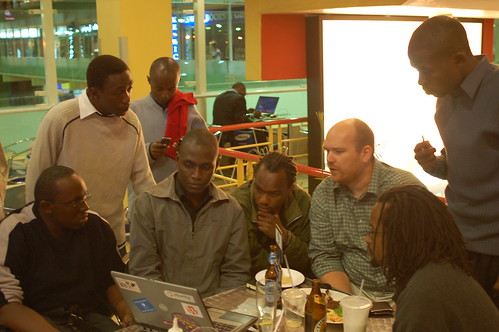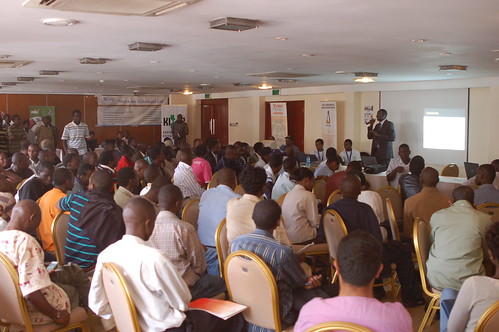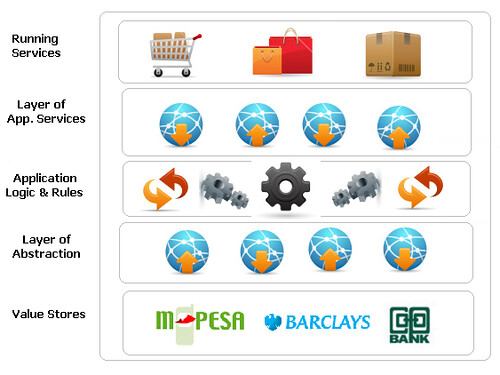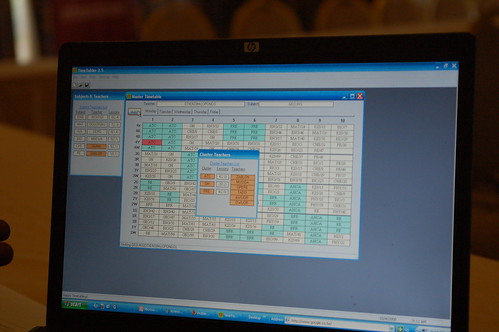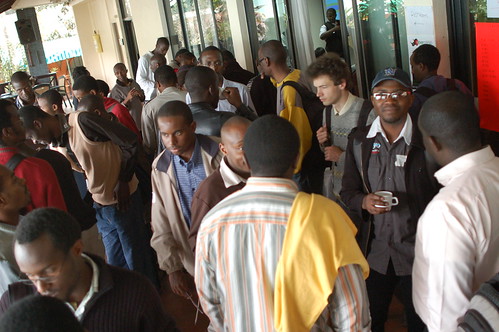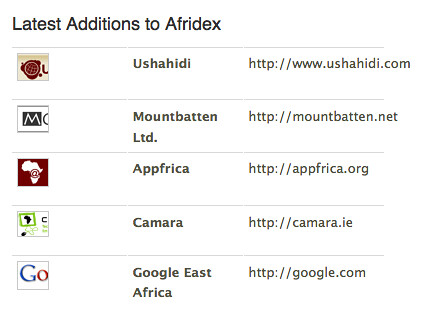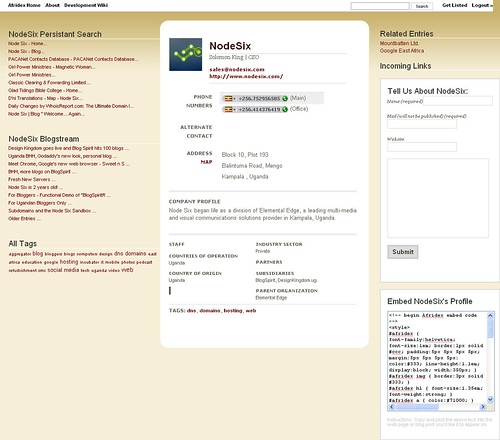WhiteAfrican
Where Africa and Technology Collide!
Page 45 of 109
I’ve had a rather active 5 days in Nairobi. Eventful enough to give an update on what’s going on with the Ushahidi developers, the pilot projects and some mobile phone fun. I head out tomorrow for Johannesburg for the MobileActive conference, and will also be attending the Friday night meetup and Barcamp Jozi on Saturday.
Ushahidi Smartphone Developments
(more on the Ushahidi blog)
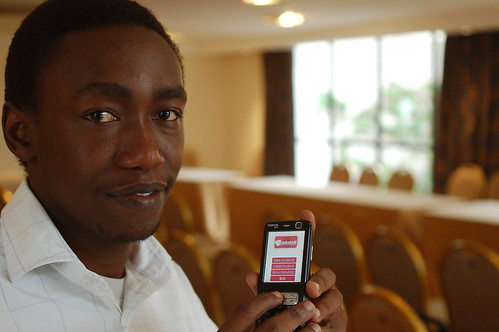
Steve Mutinda put together a working Ushahidi Java application – and surprised me with it, this Saturday. It works well, and he and Wilfred Mworia are hard at work on the Ushahidi API to ensure that this app and the Ushahidi iPhone app both can sync with the database easily.
Speaking of iPhone apps, Chris Blow and Joe Jones have finished making changes from the feedback received on the first mockups. Wilfred Mworia starts this week on his new iPhone to get this working. We’re thinking it will take about 3 weeks.
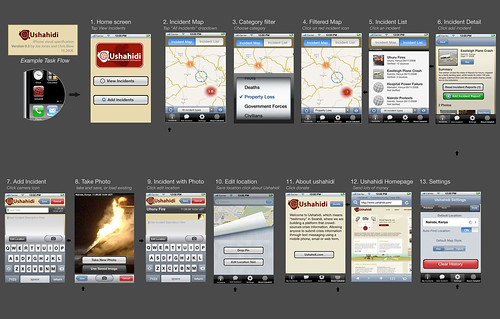
(We’re still looking for feedback on the iPhone screens)
Ushahidi Devs Meetup
Just last night we had a great Ushahidi dev meetup in Nairobi. The combination of brains and energy in the room was just incredible. We ate good food, got up to speed on the latest Ushahidi news, and had a geeky good time.
One of our advisory board members was there as well, Patrick Meier, from the Harvard Humanitarian Initiative. He fit right in, as he also grew up in Kenya and went to secondary school in Nairobi.
Jason Mule and Wilfred Mworia are going to start running monthly Ushahidi dev sessions, so get with them if you want to jump in.
Pilot Project Meetings
The last, but probably one of the more important things that I’ve been doing while in town, is the meetings I’ve been having with the different organizations that have agreed to test out the alpha release of Ushahidi. This is extremely important for us, as it gives us a chance at some feedback and direct hands-on experience with launching Ushahidi instances in the wild.
More updates on this as we get through them, but in short, everyone is very excited about being a part of the pilot and the potential for Ushahidi to change the way the gather and visualize information from the field.
I’ve had some recurring thoughts over the last couple weeks, mostly pertaining to how technologists in Africa present ourselves, and how those outside Africa see us. How does “Brand Africa” – from the technology angle – play out, and why? What is unique that we offer to the world, and why should African technology matter in the global context?
It’s about “Brand Africa”
 We need to re-frame the way we think about technology in Africa before we can expect others outside of Africa to do the same. Our challenge is to get people to realize that there is a real competitive advantage to developing and testing software in Africa. After all, if it works in Africa, it will work anywhere.
We need to re-frame the way we think about technology in Africa before we can expect others outside of Africa to do the same. Our challenge is to get people to realize that there is a real competitive advantage to developing and testing software in Africa. After all, if it works in Africa, it will work anywhere.
The development conditions are unreliable and the environment is harsh. It isn’t fun to work off slow internet connections or deal with expensive and poor mobile phone networks. All of these things, and more, make just the technological side of developing in Africa a challenge, which is why it’s also a particularly good place to try new things.
If we embrace those handicaps, we might find that there’s a silver-lining inside.
African technology exported to the world
Fring and Ubuntu are two popular products coming out of South Africa that have gone global. There are more though. When Ken Banks built FrontlineSMS, he first tested and developed it within the African context. Ushahidi is being developed in Africa because these are the conditions that will make it work anywhere in the world.
In the enterprise solutions space there are a couple companies that do some good work. Two examples of this are Herman Chinery-Hesse‘s Softtribe in Ghana, and Microhouse in Kenya. Some of their solutions are for the local markets, and some are used in bidding on international projects.
Africa as a testing grounds for new applications
There’s a really neat application called Qik, which allows you to stream video live from your phone to a website. It has amazing potential for live video reporting, especially in a war zone. So, that’s just what David Axe did – and it failed miserably. Why? Because Qik designed their application not thinking of the unreliable and poor data connections found in much of the developing world.

David gives a couple suggestions:
First, there should be a “store†function, whereby you can shoot a video in some austere location, save it to your phone’s memory, then stream it later once you’ve got a solid network.
Second, Qik needs some way to buffer videos so that, if the software briefly loses its wireless network connection, it doesn’t also lose the whole video.
Granted, Qik is probably not aiming at a global market, just the US and Europe. However, it’s a good example of how creating or testing software to work in harsh settings can make your product more robust and help you think of simple solutions (like David’s) that can make your product better for everyone.
Final Thoughts
Most people outside of Africa don’t align any type of technological edge to what we do here on the continent. In fact, most are surprised when a developer from Africa pops up on the international stage at all. Though there are fewer software developers in Africa per capita relative to their Western counterparts, what most don’t realize is that those few are really quite talented.
This means the South Africans as well as their counter parts in Ghana, Uganda and Senegal. We’re all in this together, whether we like it or not. Remember, to outsiders we’re one homogeneous landmass. What we each do reflects on everyone, whether we’re creating for local or global markets.
Finally, let’s first realize that the challenges we face also provide excellent opportunities and a competitive advantage. Then, let’s start creating world-class software here, and start exporting it to the world.
(Brand Africa image via Brand Africa Project)
[Update June 2009: A great example of just this is seen by Google with their Gmail Preview release.]
I happened to be in Nairobi for the first Skunkworks organized conference on local-grown mobile, web and desktop software – setup by Alex Gakuru. It’s a mixture of demos, with a scattering of talks by high-level sponsors and the Permanent Secretary of Information Dr. Ndemo.
Tulipe – An African Payment System
Kenneth Mwangi just gave a presentation on his new web and mobile payment application called Tulipe, which means “let’s pay” in Swahili. It’s most similar to PayPal in how it is setup, where you signup to use it on the web, and then can start using mobile phones for payment after the account is set up.
Kenneth is in is final year at Strathmore University, well known for their tech programs, and this is his final project. The prototype is still being built, but it has a lot of potential. This is one of those ideas that a savvy business investor should jump on.
TimeTabler – School Scheduling Application
Bonn Ndegwa is part of a company called Unwired Technologies, based out of Western Kenya, that works on what we call “tropically tolerant software”. In other words, they create desktop applications that work in rural, unconnected Africa on old computers. It’s a perfect example of Africans developing software for their own needs, instead of just importing solutions created for a different world.
TimeTabler has a specific niche, they focus on serving the needs of schools putting together their schedules for both classes and teachers. It doesn’t sound that exciting, but it is if you’re a headmaster that used to spend a week trying to do what now takes only an hour with TimeTabler. It’s simple, working off of an Access database, but it works – and that’s all that matters.
Reasonably priced, they have 3 pricing levels, with a one-time cost of:
- Primary schools – 9,000 ($125)
- Secondary schools – 19,000/= ($250)
- Universities – 90,000/= ($1250)
Kikwe – Send Airtime Across Africa
 Sam Kitanye and Victor Murage are talking about the Kikwe application that allows you to send airtime anywhere in the world (not just Africa). They use electronic inventory, so they bypass the need of keeping physical voucher inventory, which is very useful when you think about times when the shops run out.
Sam Kitanye and Victor Murage are talking about the Kikwe application that allows you to send airtime anywhere in the world (not just Africa). They use electronic inventory, so they bypass the need of keeping physical voucher inventory, which is very useful when you think about times when the shops run out.
Scalable to any network, because you’re sending a pin number – if you tried to do this by keeping an account, SIM card or modem, that wouldn’t work. The airtime is sent instantly.
Fraud is always a problem with these kinds of international transactions – especially when you’re dealing with airtime in Africa as it has become its own pseudo-currency. Victor talks about the ways they are tracking fraudulent activity, but past experience in this space reminds me of how difficult it is, made even harder as their product is instant.
This is a good business idea for making money from the diaspora, assuming you can manage the fraud. However, the achilles heel for use within Africa is (again) the lack of local payment systems to actually create the transaction. Hopefully they’ll get together with Kenneth of Tulipe (above) and figure something out.
Jahazi – Local Kenyan Internet Content
Mugambi is giving a review of the newer version of Jahazi (which I reviewed in it’s earlier stages). One place where you can get all your local information for Kenya. Mixing things, including email, news reader, SMS and local internet content.
It’s another good example of home-grown software made for local markets, challenges and content.
 Things are definitely heating up in the African tech sphere according to my calendar of African tech events (Events RSS feed) for the remainder of the year. From Madagascar to Mauritius there are unconferences, conferences and adhoc meetups happening at a rate I haven’t seen before. The African tech scene is definitely getting bigger and noisier.
Things are definitely heating up in the African tech sphere according to my calendar of African tech events (Events RSS feed) for the remainder of the year. From Madagascar to Mauritius there are unconferences, conferences and adhoc meetups happening at a rate I haven’t seen before. The African tech scene is definitely getting bigger and noisier.
In the next two weeks we have 8 events covering 6 countries:
- Barcamp Madagascar
- ** Skunkworks@Innovation – Nairobi, Kenya
- Commonwealth Telecommunications Organisation – Nigeria
- * Barcamp Africa – Googleplex, USA
- ** Barcamp Johannesburg – South Africa
- ** MobileActive ’08 – Johannesburg, South Africa
- Capacity – Capetown, South Africa
- Facebook Developers Garage – Kampala, Uganda
** I’ll be attending these
* I will stream in live to Barcamp Africa with the South Africans, but it’s also open in Kenya and Ghana.
On top of these scheduled conferences and unconferences, there are many meetups happening all over the place – from the monthly 27Dinner in cities around South Africa to the bi-monthly Skunkworks meetings in Kenya.
Africa’s a happening place – just watch!
[As always, if you know of an upcoming African tech event, let me know and I’ll add it to the calendar]
Jon Gosier and Paul Engulu of Appfrica has just launched Afridex, an index of African tech startups. Anyone can submit their website or mobile application and be added to the index. What an excellent idea, and really well executed as well!
It’s still brand new, but I think it has a lot of potential – we should see a lot of mobile and web companies adding themselves to the index pretty quickly. As it grows, it becomes more valuable as a resource, thus feeding itself ad infinitum.
Why is it useful?
- Persistent Search queries a search engine in combination with select keywords to track mentions of your company around the web as they occur. When any new information about a group appears online it appears here.
- Blogstream syndicates the ten most recent posts from a company blog. People can also use to follow company blogs by subscribing to the RSS feed.
- Comments allows consumer feedback and comments about a group or organization. Get instant feedback from your customers, crowd source a product review, or offer public customer service.
- Brand Watch is a feature that allows users to monitor mentions of a company across various social networks, blogs and websites. Like persistent search, Brand Watch scans all the popular web portals in africa and abroad for mentions of a company name.
- Embed allows users to export standards compliant code that will allow them to embed information related to a company in their profile. This allows data from the Afridex to be portable. This information can be used as a quick citation tool for blogs, news articles, email and reports.
If you click on any company’s name, you will be taken to the detail page on them. On that page you will find a bunch of publicly available information, including everything from contact information to blog and Twitter posts. It’s really quite impressive.
In the lower-right corner you’ll notice the “embed” code that will allow you to add a widget to the sidebar of any website with basic information about that company. The one for Node Six looks like this:

NodeSix
[Map]
URL – http://www.nodesix.com/
Email – sales@nodesix.com

Node Six began life as a division of Elemental Edge, a leading multi-media and visual communications solutions provider in Kampala, Uganda.
Information Provided by the Afridex
Summary
The only problem that I’ve found so far is that I can’t find a way to either “get listed” (it’s currently a dead link), or create a login so that I can submit a couple companies. I’m sure this is because it’s so brand new, and I’m sure Jon or Paul will leave a note here when that works.
I’m not surprised that this excellent idea came from Jon Gossier, I’m starting to expect this type of top-class work from him. I’m sure we’re going to see even more of this in the future. Brilliant.
Want to help out with this cool project? Get involved on the Afridex wiki
© 2025 WhiteAfrican
Theme by Anders Noren — Up ↑
